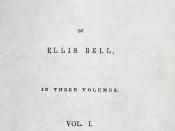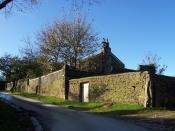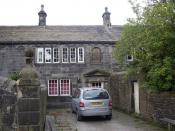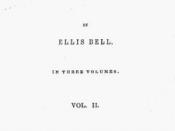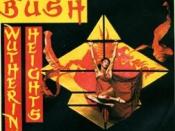Essay (Wuthering Heights) Q. Discuss the doubling of settings and structure in Wuthering Heights? Wuthering Heights written by Charlote Bronte, is a book with two settings that have strong impacts on the mood and structure. Throughout the novel, Wuthering Heights is shown as a gloomy and dark place where a great amount of evil and misery was present. On the other hand, Thrushcross Grange is displayed as a place of happiness, joy, and tranquillity. However, the surface misleads the readers through the novel, as in Wuthering Heights peace and tranquillity is found ultimately after the death of Heathcliff, and peace and tranquillity in Thrushcross Grange is diminished after the death of Catherine bringing sorrow and misery to the house. The two settings Wuthering Heights and Thrushcross Grange are contemplative representation of each other, letting one give the perspective of misery and the other displaying tranquillity.
A certain mood was set up at the beginning of the novel.
Lockwood enters Wuthering Heights and is mistreated, and degraded. This treatment sets a certain mood for Wuthering Heights, a gloomy, dark, and sad one. The house and its surroundings gives the mood a stronger affect, because the house is dark and the plants are not taken care of, and the weather is always cloudy and wet. "As I rode up, his black eyes stared at me in a most unfriendly manner from under his dark forehead."� The well-bred, civilized, and cultivated appearance of Thrushcross Grange was introduced by Heathcliff, and it was introduced lavishly. Nevertheless, he followed this opinion about Thrushcross Grange by saying: "I would not exchange my condition here for Edgar Linton at Thrushcross Grange, not for a thousand lives."� This quote from Heathcliff shows a great deal about his character, and how this attitude affects the characters and the future of the story. The description of the Linton's threshold shows how their environment and house has a happy and cheerful mood. "Shouldn't they have been happy? We should have thought ourselves in heaven! "æ Isabella "æ lay screaming at the farther end of the room, shriehing as if witches were running red hot needles into her."� This also explains the behavior of the Linton children and that they where very different from Heathcliff and Catherine. The Earnshaws found the behavior of the Lintons amusing and a bit unusual. The arguments that they had over a little dog was unnecessary, and especially to the extent where both Edgar and Isabelle where crying. The children where very different, Heathcliff and Catherine where very non-materialistic, they also loved to play outside and loved nature. However, Isabelle and Edgar are very mature in front of people, but also very immature when they are alone, and Edgar was not as rough and tough as Heathcliff was.
The two settings seem to represent the obvious characteristic of happiness and gloominess but deep down inside they represent the opposite. The death of Catherine in Thrushcross Grange is a very important fact that shows that Thrushcross Grange is not the happy and joyful place after all. The death of Catherine brings in a great amount of pain, and sorrow to Thrushcross Grange. It now represents a place where misery and never ending sorrow exists. Wuthering Heights represents the exact opposite of Thrushcross Grange, although Wuthering Heights was the place filled with the sadness and never ending act of revenge. The enlightenment of joy and peace reached at the end of the story when Heathcliff dies represents the end of evil and sorrow. Wuthering Heights is set free after Heathcliffs death, but Thrushcross Grange loses it innocence and happiness after the death of Catherine.
Wuthering Heights and Thrushcross Grange had a coil of both joy and misery. Both misery and the yearning for peace were found in the two settings, Thrushcross Grange, and Wuthering Heights. In the end, both settings gained their cry for peace and happiness.
